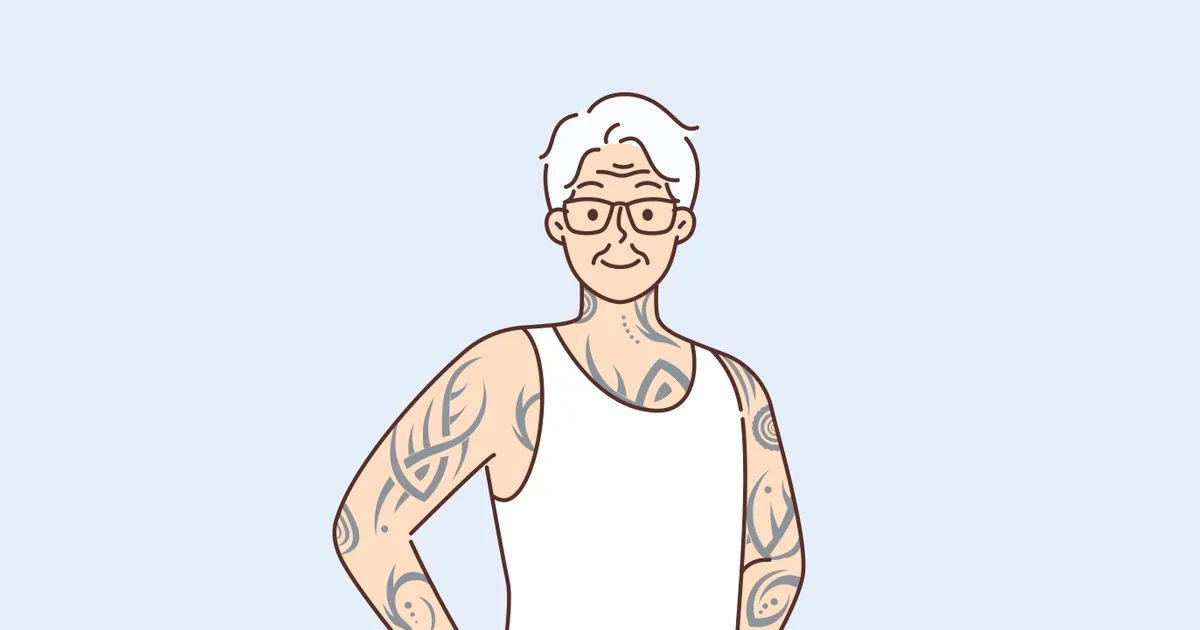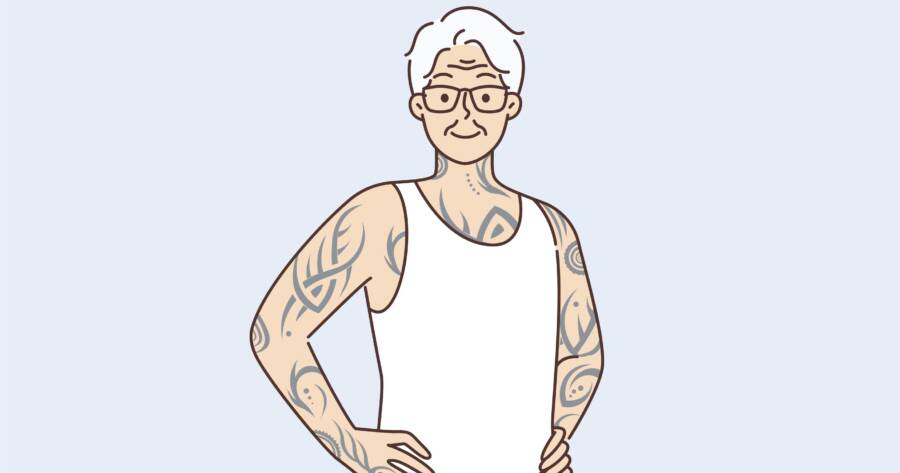Key Takeaways
- With the popularity of tattoos growing amongst seniors, more older adults are choosing to get inked as a form of personal expression and identity.
- From honoring a loved one to signaling a brave new chapter in their lives, the elderly are breaking down the social stigma against tattoos.
While tattooing has historically been associated with younger generations, the trend of seniors getting tattoos is growing. Why are many older adults suddenly embracing body art as a form of self-expression?
If you’ve always wanted to get a tattoo but felt you couldn’t pull it off, the time is now! There are a wide variety of choices available, and you can find local tattoo shops if you start searching now – cause it’s never too late.
The Proof Is In The Ink
A 2019 survey conducted by Ipsos found that 16 percent of adults aged 55 and older had at least one tattoo. Even if many of those tattoos are 30 years old, the sight of tattooed seniors is breaking a strange cultural stigma.
While tattoos were once considered taboo and associated with counter-culture, they have become more socially acceptable in many parts of the world. And since 36 percent of adults aged between 18 and 29 have at least one tattoo, logic dictates that seniors will become increasingly tattooed over the coming decades.
Self Expression
Seniors are getting tattoos for the same reason that young people typically get them: to express themselves. Unlike teenagers, however, seniors have the advantage of knowing which tattoos they’ll be happy with for the long haul.
Common tattoo choices revolve around cultural and religious identities, including flags and quotes in their native language. The tradition of military tattoos is still popular, as well. However, seniors are beginning to branch out, expressing their favorite bands, sports heroes, and animals on their skin.
Commemoration
Many people get tattoos to commemorate a significant life event, such as a marriage, the birth of a child, or a tragic passing. Many seniors choose to get permanent reminders that honor their family members, spouses, or children. These tattoos may include names, birthdates, or other meaningful symbols.
Since the elderly have more life experiences to share, it makes sense to go under the needle and memorialize special events in their lives. And although the most common tattoo regret is getting someone’s name inked onto their skin, older people can generally be more confident in avoiding that mistake.
Cultural and Spiritual Significance
In some cultures, tattoos have cultural or spiritual significance. In Hindu culture, for example, tattoos are sometimes used as a way to honor deities. Other times, they are used as a form of protection against evil spirits. It’s also common for Indian women to get henna tattoos during religious festivals and celebrations.
Many Native American tribes have a rich tradition of tattooing as well. The designs and symbols used in these tattoos often represent the wearer’s connection to their tribe and spiritual beliefs. Likewise, Celtic tattoos are often used to honor Celtic heritage and cultural traditions. The intricate knots and designs used in Celtic tattoos are often associated with nature, spirituality, and the cycle of life.
Personal Growth
American actress Bette Davis once said, “Growing old is not for sissies”, and boy, was she right! The phrase is now widely used to express the challenges and difficulties of aging. It takes courage to face those challenges head-on.
With that in mind, some seniors are getting tattoos to step outside of their comfort zone. It can also be a way to embrace new experiences and overcome fears. In that regard, expressing oneself with a tattoo can be an act of independence.
Things To Consider
Even though many seniors have tattoos that have been – excuse the pun – “grandfathered” into old age, seniors are increasingly getting inked! According to one statistic, one in 20 people who get tattooed nowadays are over the age of 60.
However, if you’re considering getting a tattoo in your later years, here are some things you should know:
- As long as you don’t have any pre-existing health issues, getting tattooed entails no greater risk to the elderly than it does for young people.
- Depending on your age, you may have to consider the type of tattoo that will work with your skin. If you have fragile wrinkles, a bold design will work much better than an intricate one.
- As an added perk, tattoos can cover up muscle loss, stretch marks, and scars that come with age.
It’s Never Too Late
More and more older adults are choosing to get inked as a form of personal expression and identity. As attitudes toward aging and self-expression continue to evolve, we may see even more older adults embracing the art of tattooing in the years to come.
Whether they’re honoring a loved one, celebrating a milestone, or expressing themselves in a unique way, seniors are proving that it’s never too late to get a tattoo and make a bold statement.
 Shutterstock: Alphavector
Shutterstock: Alphavector


